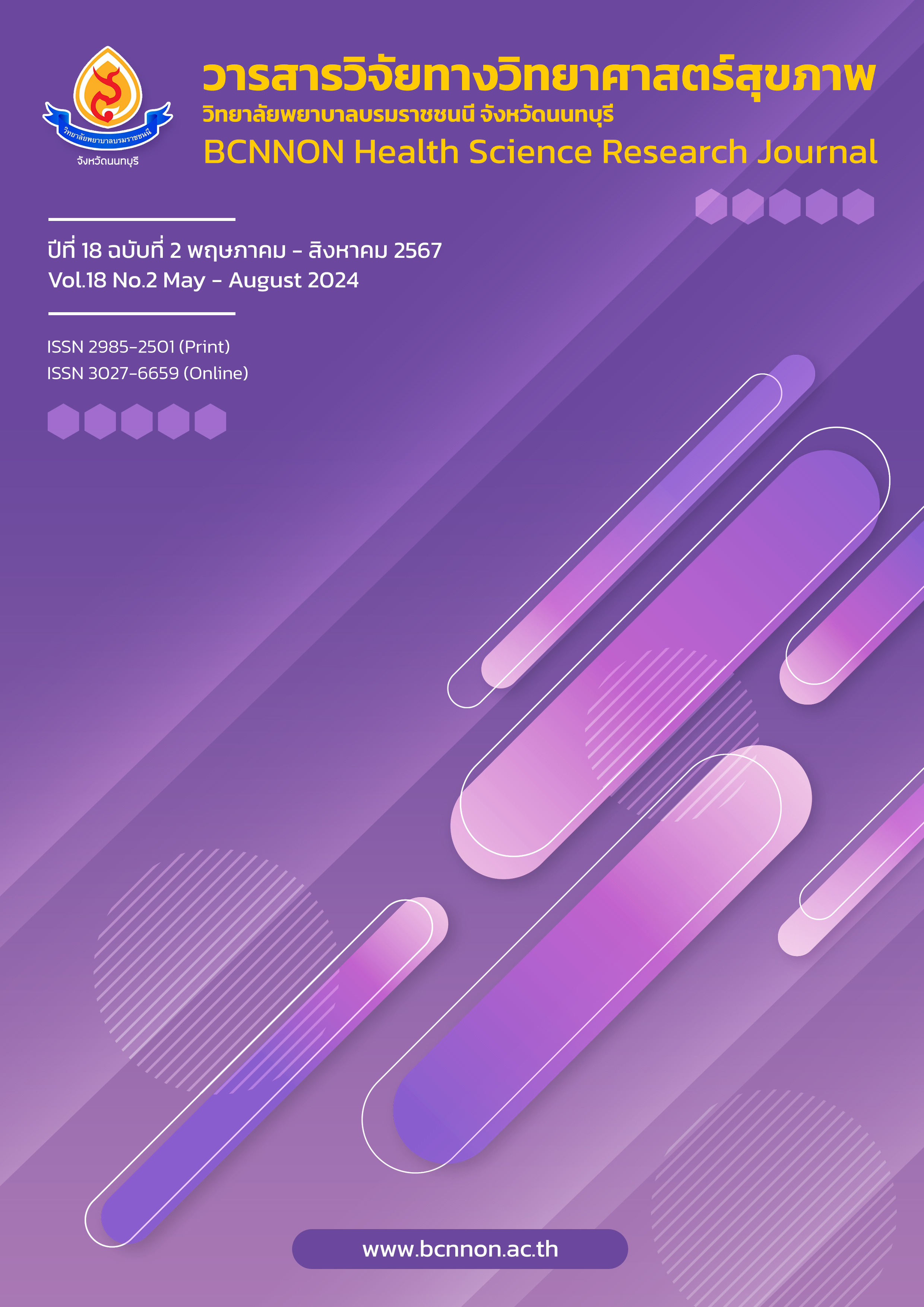กลยุทธ์จิตวิทยาเชิงบูรณาการเพื่อเสริมสร้างภูมิคุ้มกันภาวะหมดไฟ ในการทำงานของพยาบาลหอผู้ป่วย โรงพยาบาลเอกชน
Main Article Content
บทคัดย่อ
บทนำ : กลยุทธ์จิตวิทยาเชิงบูรณาการเพื่อเสริมสร้างภูมิคุ้มกันภาวะหมดไฟในการทำงาน ช่วยให้พยาบาลสามารถนำตนเองผ่านพ้นอุปสรรค ดำเนินชีวิตอย่างมีความสุข ประสบความสำเร็จในการทำงาน
วัตถุประสงค์การวิจัย : 1) ศึกษาภูมิคุ้มกันภาวะหมดไฟในการทำงาน 2) ศึกษาผลการใช้กลยุทธ์จิตวิทยาเชิงบูรณาการ
วิธีดำเนินการวิจัย : การวิจัย แบบผสานวิธี ตัวอย่าง คือ พยาบาลวิชาชีพ จำนวน 50 คน แบ่งเป็นกลุ่มทดลองและกลุ่มควบคุม กลุ่มละ 25 คน เครื่องมือวิจัย ประกอบด้วย 1) แบบวัดภูมิคุ้มกันภาวะหมดไฟในการทำงาน 2) แบบสอบถามกลยุทธ์จิตวิทยาเชิงบูรณาการเพื่อเสริมสร้างภูมิคุ้มกันภาวะหมดไฟในการทำงาน และ 3) แบบสัมภาษณ์เชิงจิตวิทยา วิเคราะห์ข้อมูลเชิงปริมาณด้วยสถิติเชิงพรรณนา One way ANOVA with repeated measure และสถิติ Two way ANOVA with repeated measure วิเคราะห์ข้อมูลเชิงคุณภาพด้วยการวิเคราะห์เนื้อหา
ผลการวิจัย : ข้อมูลเชิงปริมาณ พบว่า พยาบาลวิชาชีพมีภูมิคุ้มกันภาวะหมดไฟในการทำงาน ค่าเฉลี่ยโดยรวมอยู่ในระดับสูง (x̄=2.43, SD=0.29) กลยุทธ์จิตวิทยาเชิงบูรณาการเพื่อเสริมสร้างภูมิคุ้มกันภาวะหมดไฟในการทำงาน ประกอบด้วย กลยุทธ์การจัดการตนเอง กลยุทธ์การปรับเปลี่ยน และกลยุทธ์เพื่อการเปลี่ยนแปลง คะแนนเฉลี่ยภาวะหมดไฟในการทำงานของกลุ่มทดลองหลังการทดลองสูงกว่าก่อนทดลอง แตกต่างอย่างมีนัยสำคัญทางสถิติที่ระดับ .01 ผลการวิเคราะห์ข้อมูลเชิงคุณภาพ พบว่ากลุ่มทดลองมีความเชื่อมั่นในการบริการงานการพยาบาล สามารถรับรู้ กำกับตนเอง และเห็นคุณค่าในตนเอง
สรุปผล : การสร้างเสริมภูมิคุ้มกันภาวะหมดไฟในการทำงานพยาบาล ช่วยให้พยาบาลมีความสามารถเผชิญสถานการณ์ต่าง ๆ ได้ มีความมั่นใจในตนเองและเห็นคุณค่าของตนเองและผู้อื่นเพิ่มขึ้น
Downloads
Article Details

อนุญาตภายใต้เงื่อนไข Creative Commons Attribution-NonCommercial-NoDerivatives 4.0 International License.
บทความที่ได้รับการตีพิมพ์เป็นลิขสิทธิ์ของวิทยาลัยพยาบาลบรมราชชนนี จังหวัดนนทบุรี
ข้อความที่ปรากฏในบทความแต่ละเรื่องในวารสารวิชาการเล่มนี้เป็นความคิดเห็นส่วนตัวของผู้เขียนแต่ละท่านไม่เกี่ยวข้องกับวิทยาลัยพยาบาลบรมราชชนนี จังหวัดนนทบุรี และคณาจารย์ท่านอื่น ในวิทยาลัยฯ แต่อย่างใด ความรับผิดชอบองค์ประกอบทั้งหมดของบทความแต่ละเรื่องเป็นของผู้เขียนแต่ละท่าน หากมีความผิดพลาดใด ๆ ผู้เขียนแต่ละท่านจะรับผิดชอบบทความของตนเองแต่ผู้เดียว
เอกสารอ้างอิง
Sumalai P. The register nurses’ burnout in Bamrasnaradura infectious disease institute. Journal of Prachomklao College of Nursing, Phetchaburi Province. 2021;4(2):66-78. (in Thai).
Na Wichian N, Rattanapongpinyo T, Thama-Apipon S. Factors affecting the nurse performance of government hospital nurses in Bangkok. Journal of The Police Nurse. 2020;12(2):277-89. (in Thai).
Department of Mental Health, Ministry of Public Health. Department of mental health joins hands with Sathiantham, a mental rehabilitation center for medical personnel workers in the COVID-19 situation and at-risk groups of people to create a prototype for the Bangkok area. [internet]. 2020 [cited 2020 Apr 11]. Available from: https://th.rajanukul.go.th/_adminfile-downloadFM-9372-1591591285.pdf. (in Thai).
Maneewan W, Songbundit A. Factor affecting teacher burnout of teacher under the Secondary Education Service Area Office 2 in Bangkok. SWU Educational Administration Journal. 2022;19(36):196-207. (in Thai).
Cheaplamp S, Dangdomyouth P. Burnout syndrome. Royal Thai Air Force Medical Gazette. 2020;65(2):44-52. (in Thai).
Sinutpattanasuk P, Wijitraphan T. Risk factors of job burnout among personnel of Sanpatong hospital, Chiangmai province. Journal of Health Science. 2022;31(1):154-63. (in Thai).
Pimthong S. Antecedents of employee retention of the university academic staffs in Thailand. Journal of Business Administration. 2014;142(9):16-32. (in Thai).
Pimsakka R. Nursing management during the crisis of the COVID-19 pandemic. Thai Journal of Nursing. 2021;70(3):64-71. (in Thai).
Boonkiatcharoen V, Saengdiatha B, Vimolket T. Burnout among perioperative nurses in public hospitals in Bangkok. Royal Thai Army Medical Journal. 2018;71(3):163-72. (in Thai).
Santiparp P. Appreciative critical reflection in transformative learning process for enhancing self-esteem of undergraduate public health students: a qualitative study. The Turkish Online Journal of Educational Technology. 2017;39:39-48.
Sawaengdee K, Crisis of nursing shortage in health service facilities under office of permanent secretary, ministry of public health: policy recommendations. Journal of Health Science. 2017;26(2):456-68. (in Thai).
Progenuity. Adaptive strategy. [internet]. 2020 [cited 2024 Aug 27]; Available from: https://www.progenuity.com.au/about.html.
Choowichian N, Thapinta D, Sethabouppha H, Thungjaroenkul P. Factors predicting stress among nurses in the situation of unrest of the four Southern border provinces of Thailand. Walailak Journal of Science and Technology. 2020;17(3): 269-84. (in Thai).
Kritthathip B, Boonchuaythanasit K. Relationship between self-efficacy and social support on coping with stress and coping with stress behaviors of nurses working in Pramongkutklao hospital. Journal of Health Science Research. 2016;10(2):1-7. (in Thai).
Panomrit S, Chareonsuk S, Ananchaipatana N. Self-regulation learning among nursing students who were different in perception of self-efficacy. Journal of Nursing and Education. 2011;4(2):94-107. (in Thai).
Photawon P, Pensuwan A, Wongpradis S. Breathing meditation program and stress level of nursing students in labor room practicum. The Southern College Network Journal of Nursing and Public Health. 2014;1(2):49-59. (in Thai).
Buppata T, Jaroenjitkul C, Kasiphol T, Nunsunanon S, The effectiveness of resilience enhancing program with mindfulness based on stress reduction and Tai Chi muscle relaxation among second year nursing students. Thai Red Cross Nursing Journal. 2022;15(2):161-173. (in Thai).


